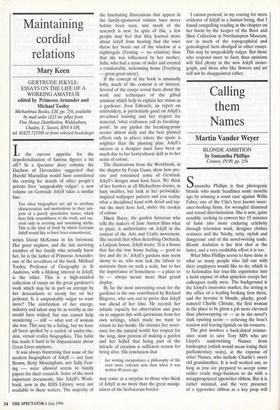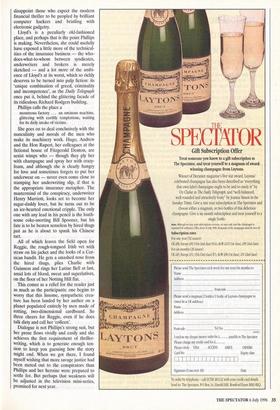Calling them Names
Martin Vander Weyer
BLONDE AMBITION by Samantha Phillips Century, £9.99, pp. 256
Samantha Phillips is that photogenic blonde who made headlines some months ago by winning a court case against Willis Faber, one of the City's best known insur- ance-broking firms, for wrongful dismissal and sexual discrimination. She is now, quite sensibly, seeking to convert her 15 minutes of fame into more enduring celebrity through television work, designer clothes ventures and the 'bitchy, witty, stylish and dangerous' end of the novel-writing trade. Blonde Ambition is her first shot at the latter, and a very creditable effort it is too. What Miss Phillips seems to have done is what so many people who fall out with their employers would like to do, which is to fictionalise her true-life experience into a lurid expose of what spineless creeps her colleagues really were. The background is the Lloyd's insurance market, the setting is the office of a leading broking firm there, and the heroine is blonde, plucky, good- natured Charlie Christie, the first woman in the place to be given a job more elevated than photocopying or — as in the novel's dark opening scene — relieving the boss's tension and leaving lipstick on his trousers. The plot involves a back-dated reinsur- ance scam to save Tory MPs who are Lloyd's underwriting Names from bankruptcy (which would mean losing their parliamentary seats), at the expense of other Names, who include Charlie's sweet old grandmother. It is well worked out, so long as you are prepared to accept some rather crude stage-business to do with a misappropriated typewriter ribbon. But it is rather minimal, and the very presence of a typewriter ribbon as a key prop will
disappoint those who expect the modern financial thriller to be peopled by brilliant computer hackers and bristling with electronic gadgetry.
Lloyd's is a peculiarly old-fashioned place, and perhaps that is the point Phillips is making. Nevertheless, she could usefully have exposed a little more of the technical- ities of the insurance business — the who- does-what-to-whom between syndicates, underwriters and brokers is merely sketched — and a lot more of the ambi- ence of Lloyd's at its worst, which so richly deserves to be turned into pulp fiction: its `unique combination of greed, criminality and incompetence', as the Daily Telegraph once put it, behind the glittering facade of its ridiculous Richard Rodgers building.
Phillips calls the place a monstrous factory . an ominous machine, glittering with earthly temptations, waiting for its daily intake of victims.
She goes on to deal conclusively with the masculinity and morals of the men who make its machinery work. Hugo, Andrew and the Hon Rupert, her colleagues at the fictional house of Fitzgerald Denton, are sexist wimps who — though they ply her with champagne and spray her with crazy- foam, and although she is clearly hungry for love and sometimes forgets to put her underwear on — never even come close to stamping her underwriting slip, if that is the appropriate insurance metaphor. The mastermind of the conspiracy, underwriter Henry Marriott, looks set to become her sugar-daddy lover, but he turns out to be an ice-hearted emotional cripple. The only one with any lead in his pencil is the loath- some coke-snorting Bill Spooner, but his fate is to be beaten senseless by hired thugs just as he is about to spank his Chinese tart.
All of which leaves the field open for Reggie, the rough-tongued Irish vet with straw on his jacket and the looks of a Cor- sican bandit. He gets a smashed nose from the hired thugs, plies Charlie with Guinness and rings her Lutine Bell at last, amid lots of blood, sweat and superlatives, on the floor of her Notting Hill flat.
This comes as a relief for the reader just as much as the participants: one begins to worry that this lissome, sympathetic crea- ture has been landed by her author on a planet populated entirely by men made of rotting, two-dimensional cardboard. So three cheers for Reggie, even if he does talk dirty and call her 'colleen'.
Dialogue is not Phillips's strong suit, but her prose flows vividly and easily and she achieves the first requirethent of thriller- writing, which is to generate enough ten- sion to keep you guessing how the story might end. When we got there, I found myself wishing that more savage justice had been meted out to the conspirators than Phillips and her heroine were prepared to settle for. But perhaps that weakness will be adjusted in the television mini-series, promised for next year.



























































 Previous page
Previous page